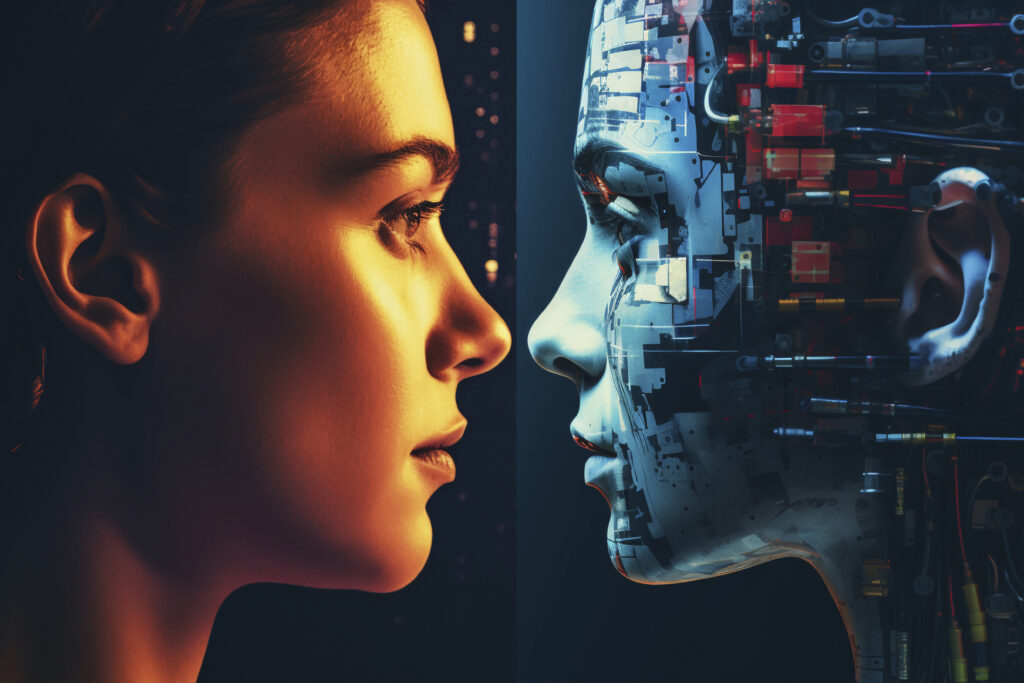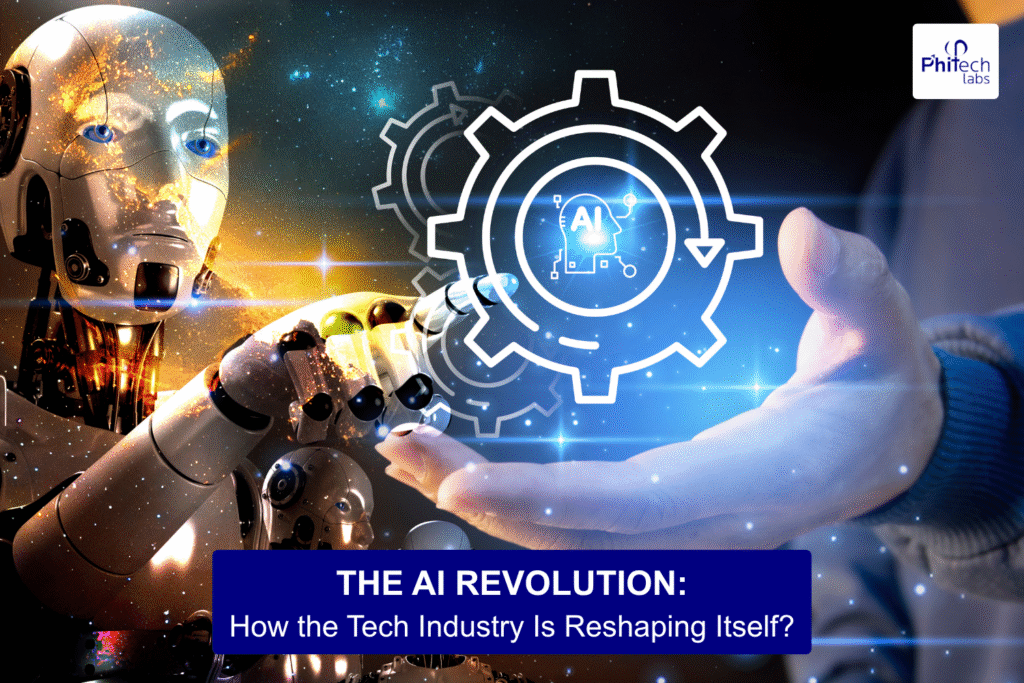The AI era isn’t something that’s coming in the future, it’s already here, and the tech world is leading the charge. Not long ago, AI revolution was just a trendy buzzword. Today, it’s a must-have for tech company that wants to stay competitive and grow. A recent McKinsey & Company survey found that almost 80% of businesses are already using generative AI in some way, though only a few have started seeing big results from it so far.
In this article, we’ll explore how the tech industry is reshaping itself under the influence of AI: the structural shifts, the workforce impact, the business model changes, and the strategic imperatives for the future.
Table of Contents
1. A shift from pilot projects to full-scale transformation

Initially, many tech firms experimented with AI as an add-on, a pilot project in the corner of the organisation. But now the narrative has changed: AI is becoming the backbone of operations and strategy. McKinsey notes that while many companies have dipped into generative AI, fewer have achieved bottom-line growth from it yet.
This shift means that tech companies are reorganising themselves not just their product roadmap, but entire functions such as customer support, R&D, cloud infrastructure and analytics are being re-wired around AI. One article described how AI isn’t just replacing tasks it’s reconfiguring how work gets done in the tech industry.
In effect, the industry is moving from “let’s try AI” to “we are an AI-driven business”.
2. Business models under strain, and new opportunities
With AI becoming pervasive, tech companies are facing both disruption and opportunity. On one hand, cost savings come from automating routine tasks, improving decision‐making with data, and speeding up innovation cycles. For example, AI’s automation of repetitive work frees human teams to focus on creative and strategic tasks.
On the other hand, this also forces major changes in business models. Legacy workflows, long‐term contracts, and monolithic product cycles are being challenged. Tech businesses need to adopt agile models, embed AI in every layer, and compete on speed, intelligence and adaptability. According to a review in ScienceDirect, AI’s implementation is pointing to profound changes in operations, culture and value-creation.
In short: companies that fail to integrate AI deeply risk becoming obsolete; those that do may unlock entirely new markets and revenue streams.
3. Workforce and skill-structure changes
One of the most visible shifts is in the workforce. AI is not just automating tasks; it’s changing the nature of jobs in the tech industry. An article described this as a nuanced transformation: not simply “robots taking our jobs”, but roles shifting, and job definitions evolving.
Key labour / skill trends include:
- Upskilling and reskilling: Tech workers now must add AI, data-science, cloud & automation skills to stay relevant.
- New roles: From AI ethics leads to agent-based automation designers, new job titles are emerging.
- Displacement concerns: Especially for repetitive or junior roles, automation is a real threat. A study found that “automation AI” tends to negatively impact employment and wages in low-skilled occupations, whereas “augmentation AI” can raise wages and create new work in higher-skilled domains.
Thus, the tech industry is emphasising continuous learning and human-machine collaboration rather than human vs machine.
4. Ethical, governance and strategic implications
With power comes responsibility, and in the AI-reshaped tech industry, governance and ethics are front of mind. Integrating AI at scale brings risks around bias, transparency, accountability and regulatory compliance. One paper on the IT/education landscape observed that “human-centred design principles and ethical considerations become crucial requirements for the responsible development and implementation of AI systems”.
Furthermore, senior tech leadership must master not just AI technology but business transformation, cross-functional alignment and ethical strategy. In the domain of executive IT roles, organisations now look for leaders who understand business, tech and ethics simultaneously.
In short: the tech industry isn’t just adopting AI tools, it’s rethinking how decisions are made, how value is measured, and how humans and machines team up responsibly.
5. What this means for tech companies in India and globally
For tech firms, especially in India and other emerging markets, the AI revolution offers both a challenge and a massive opportunity:

- Competitive advantage: By integrating AI deeply, companies can leapfrog slower incumbents.
- Talent strategy: Indian firms must invest in AI-skills, retooling engineering teams, and fostering data-literacy.
- Innovation-first culture: Embedding experimentation, rapid iterations and human-AI collaboration.
- Responsible AI: Building governance frameworks early to differentiate on trust, ethics and sustainability.
- Global partnerships: Leveraging cloud, edge computing and global AI networks to scale solutions quickly.
Those firms that treat AI as a transformation engine (and not a bolt-on) will shape the next wave of tech platforms and ecosystems.
6. How tech businesses should act now
Given all this change, what should a tech company (or tech-services provider) do to stay ahead? Here are some key actions:
- Audit your AI readiness: Map current workflows, identify where AI can add value (e.g., analytics, automation, customer-insights).
- Reskill teams proactively: Invest in data-science, MLOps, AI-ethics training. Encourage collaboration between domain experts and AI specialists.
- Embed AI in product and operations: Move beyond experiments. Design products and processes where AI is integral, not optional.
- Establish governance and ethics frameworks: Build policies around data use, fairness, transparency and continuous monitoring.
- Foster human-AI collaboration: Define how humans and AI systems will work together; emphasise human judgment, creativity, and oversight.
- Measure outcomes and scale: Track impact (costs, efficiency, product-time-to-market, customer satisfaction) and scale what works.
7. The bottom line
The Artificial Intelligence revolution isn’t a distant future event, it’s unfolding now. For the tech industry, it means a re-shaping of business models, workforce dynamics, product innovation and corporate strategy. Those that adapt, by embracing AI as a core pillar, investing in talent and ethics, and re-architecting for value creation, will define the next era of tech leadership.
In the words of one article: “You are living through a revolution where algorithms increasingly dictate speed, accuracy, and scale of value creation.”
For tech companies in India and globally, the message is clear: this isn’t about “will we adopt AI?”, it’s about how we integrate it, who gets to design it, and what new value we will deliver in a world where intelligence is both human and artificial.

